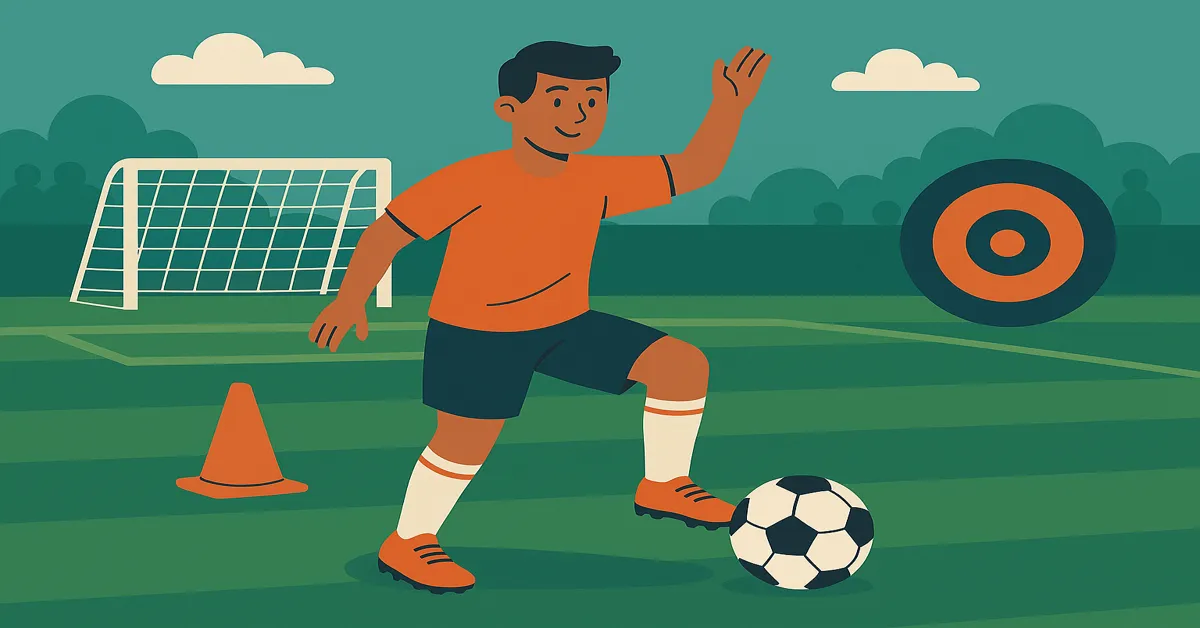The FIFA World Cup is the pinnacle of global soccer competition, drawing millions of fans and the most elite players from every corner of the planet. But behind every jaw-dropping goal, tactical maneuver, and unforgettable match is a foundation of skills that have been honed for years. Understanding soccer skills World Cup goes beyond flashy footwork — it encompasses precision, awareness, physical preparation, and mental resilience. This article breaks down the essential skills players need to compete on the world’s biggest stage, how they’re developed, and what separates World Cup-level athletes from the rest.
Introduction to World Cup-Level Soccer Skills
Soccer skills World Cup level are not just about playing well—they’re about executing with excellence under intense pressure, against the best competition in the world. Whether it’s controlling a difficult ball, making a split-second pass, or sprinting back to stop a counterattack, every action is magnified under the soccer skills World Cup spotlight. These skills are sharpened over years of training, molded by tactical coaching, and tested in international competition.
At the core, every great World Cup player excels in four pillars: technical proficiency, tactical intelligence, physical ability, and psychological readiness.
Foundational Skills Every Player Needs
No matter the position or style of play, these skills form the bedrock of every elite soccer player:
- Ball Control: A player’s ability to manage the ball in tight spaces, under pressure, and at speed.
- Passing Accuracy: Especially crucial in tournaments, precise passing opens defenses and sustains possession.
- Dribbling: Not just flair, but function—dribbling must have purpose, especially in transitioning phases.
- First Touch: The ability to bring the ball under control instantly to set up the next move.
- Shooting Technique: World Cup goals often come from limited chances. Finishing ability is key.
These core abilities, when perfected, allow players to function effectively regardless of opponent, conditions, or game tempo.
Tactical Intelligence: Reading the Game
In the World Cup, players must not only be technically sound but also mentally sharp. Tactical intelligence includes:
- Spatial Awareness: Knowing where teammates and opponents are at all times.
- Decision Making: Choosing the right option in high-pressure moments.
- Positional Discipline: Staying organized within a team’s structure, especially defensively.
- Off-the-ball Movement: Creating space for oneself or others without direct involvement in play.
Tactics evolve rapidly during matches. Elite players can adapt in real-time—a skill that separates tournament winners from early exits.
Physical Conditioning for Peak Performance
Soccer at the highest level demands exceptional physical fitness. The World Cup compresses several high-intensity matches into a short span, often in extreme climates. Essential physical traits include:
- Endurance: Ability to perform consistently over 90 minutes or more.
- Speed and Agility: Quick changes in direction and explosive sprints are vital, especially in attacking transitions.
- Strength and Balance: Competing shoulder-to-shoulder and holding off challenges.
- Recovery and Resilience: Fast recuperation between matches through nutrition, sleep, and injury management.
Conditioning is customized for position—fullbacks need sprint stamina, while midfielders require all-around endurance and aerobic power.
Mental Strength in High-Stakes Matches
The psychological demands of the World Cup are immense. Players must manage nerves, expectation, and media attention while performing flawlessly. Key mental skills include:
- Concentration: Staying locked in through all phases of play.
- Composure: Making the right choices under emotional strain.
- Confidence: Believing in one’s ability to compete against top-tier talent.
- Resilience: Bouncing back from setbacks like missed chances or conceding goals.
National teams often employ sports psychologists to help players cultivate mindfulness and emotional intelligence before and during the tournament.
Skill Development by Position
Each position has unique skill priorities:
- Goalkeepers: Shot-stopping, distribution, command of the penalty area, and anticipation.
- Defenders: Tackling, positioning, aerial duels, and composure under pressure.
- Midfielders: Vision, ball retention, transitional awareness, and tempo control.
- Forwards: Finishing, movement off the ball, and exploiting defensive weaknesses.
Modern systems demand hybrid skills—defenders who can build play, midfielders who can score, and wingers who track back.
Role of Coaches in Skill Advancement
Great coaches are instrumental in refining World Cup-ready skills. They design training environments that simulate match conditions, emphasize individual development, and ensure tactical cohesion. Key coaching methods include:
- Video Analysis: Breaking down past performances to target specific improvements.
- Micro-coaching: 1-on-1 sessions to fine-tune technique.
- Scenario Drills: Training under stress to prepare for real-time decisions.
- Feedback Loops: Continuous dialogue between player and coach for accountability and support.
Advanced Drills for World-Class Execution
High-level drills are focused, functional, and fatigue-resistant. Examples:
- Rondo Variants: Tight-space possession exercises that mimic match intensity.
- Pressure Passing: Practicing with limited time to force instinctive decisions.
- Finishing Under Duress: Shooting after sprints or with defenders closing in.
- Transition Games: 5v5 matches emphasizing counterattacks and recovery runs.
Repetition builds muscle memory, but variation ensures adaptability—essential in the unpredictable nature of World Cup play.
Technology and Data in Skill Training
Modern players and coaches leverage technology to enhance skill acquisition:
- GPS and Heart Monitors: Measure workload and optimize training loads.
- Virtual Reality: Simulate game situations for mental preparation.
- Motion Analysis: Break down biomechanics of passes, shots, and movements.
- Tactical Analytics: Track positioning and decision-making effectiveness in real time.
This data helps fine-tune preparation and uncover marginal gains that can make the difference in tight matches.
Skills from World Cup Legends
What makes certain players unforgettable? Their skills rise in the biggest moments.
- Zinedine Zidane: First touch and spatial manipulation.
- Diego Maradona: Balance, dribbling, and vision.
- Marta: Movement and technical precision.
- Luka Modrić: Tactical orchestration and endurance.
- Kylian Mbappé: Pace, timing, and finishing in transitions.
Studying their game film shows how technique, intelligence, and instinct blend into excellence.
Preparation Strategies Used by National Teams
Elite national teams spend months planning for every possibility:
- Scouting Opponents: Identifying tendencies and weaknesses.
- Simulating Conditions: Training in similar climates or altitudes.
- Team Cohesion Camps: Building chemistry and unity.
- Mental Conditioning: Group sessions to foster focus and belief.
Preparation is not just physical—it’s holistic, ensuring players are ready in every dimension.
Common Mistakes Players Make
Even elite players can falter. Common pitfalls include:
- Over-dribbling: Losing possession trying to do too much.
- Poor Decision-Making: Rushing passes or choosing low-percentage shots.
- Lapses in Focus: Switching off during set pieces or transitions.
- Ignoring Recovery: Underestimating rest between games, leading to fatigue and injury.
Avoiding these mistakes requires discipline, maturity, and coaching.
How to Practice Like a World Cup Player
Train with intent and structure:
- Daily Routine: Skill drills, tactical study, physical training, and recovery.
- Feedback-Oriented: Use video or coach input after every session.
- Simulate Pressure: Play with stakes—timed drills, peer evaluations.
- Track Progress: Keep a performance journal or digital record.
It’s not about doing more—it’s about doing better.
Youth Development and Pathways to the Top
Soccer skills World Cup stars often start young, but their paths differ. Successful development includes:
- Technical Focus at Early Ages: Small-sided games and repetition.
- Diversified Training: Exposure to various positions and roles.
- Elite Academies: Structured progression with access to facilities and competition.
- International Exposure: Youth tournaments and regional team selection.
Scouting now begins at ages 12–14. Those who stand out combine raw ability with coachability and game IQ.
Conclusion: Building Skills for the Global Stage
Soccer skills World Cup level are not born—they are built. With the right mindset, training environment, and support network, any talented player can rise through the ranks. Whether you’re an aspiring pro, a coach, or an enthusiast, understanding these layers of development is essential.
The difference between good and great often lies in the smallest details. And in the soccer skills World Cup, those details define legacies.
ALSO READ: Museland AI: The Emerging Nexus of Artificial Intelligence and Creative Expression
FAQs
1. What are the most important soccer skills World Cup?
Ball control, passing accuracy, tactical intelligence, and mental composure are crucial for success at the World Cup level.
2. How do World Cup players train differently than club players?
Training is more intensive, focused on team chemistry, recovery, and adapting quickly to tournament conditions and opponents.
3. Can young players develop World Cup-level skills at home?
Yes, with structured training, video analysis, feedback, and access to competitive play, young players can build a solid foundation.
4. What role does technology play in skill development today?
Technology helps track performance, simulate match conditions, and improve decision-making through data and visual analysis.
5. How long does it take to develop elite soccer skills?
It typically takes 8–10 years of consistent, high-quality training and competition to develop the skills seen at the World Cup level.









